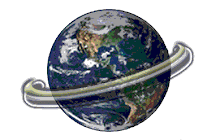One of the earliest scientific approaches to weather prediction occurred around 300 B.C.E., documented in Aristotle's work, "Meteorologica." The ancient Greeks invented the term meteorology, which means the study of atmospheric disturbances or meteors. Aristotle tried to explain the weather through the interaction of earth, fire, air, and water. His pupil Theophrastus really went to work and wrote the ultimate weather text The Book of Signs, which contained a collection of weather lore and forecast signs. Amazingly it served as the definitive weather book for 2,000 years! (What if they're still reading this 2,000 years from now?)
Weather Words
"There is a sound of abundance of rain."
—1 Kings
Theophrastus's weather lore included colors of the sky, rings and halos, and even sound. Hippocrates—also known as "the Father of Medicine"—was also very much involved with the weather. His work On Airs, Waters, and Places became a medical classic, linking good health with favorable weather conditions. The opening of his work begins with the advice that those who wish to investigate medicine must first begin with an understanding of seasons and weather.
Weather-Speak
Meteorology is the science of studying the atmosphere.
Weather forecasting advanced little from these ancient times to the Renaissance. Then beginning in the fifteenth century, Leonardo da Vinci designed an instrument for measuring humidity called a hygrometer. Later Galileo Galilei invented the thermometer and his student Evangelista Torricelli came up with the barometer for measuring air pressure. With these tools, people could monitor the atmosphere. Then Sir Isaac Newton derived the physics and mathematics that accurately described the atmosphere. Newton's work on motion remains The Book of Signs of modern meteorology. To this day, his principles form the foundation of all computer analyses and predictions.
Our brief exploration into forecasting pretty much follows the techniques and methods developed by early weather wizards. From the earliest of times, hunters, farmers, warriors, shepherds, and sailors learned the importance of being able to tell what the weather might be up to next. Ancient civilizations appealed to the gods of the sky. The Egyptians looked to Ra, the sun god. The Greeks sought out the all-powerful Zeus. Then there was Thor, the god of thunder and lightning in ancient Nordic times. Some societies, such as the Aztecs, used human sacrifice to satisfy the rain god, Tlaloc. Native American and Australian aborigines performed rain dances. Those who were able to predict the weather and seemed to influence its production were held in highest esteem. After all, they appeared to be very well connected.
Wednesday, February 18, 2009
Subscribe to:
Post Comments (Atom)

No comments:
Post a Comment